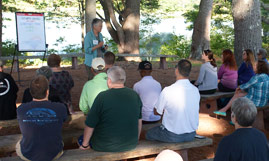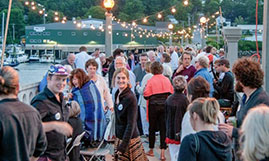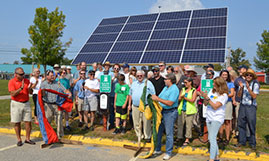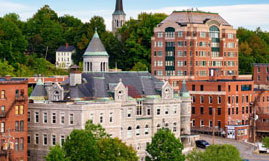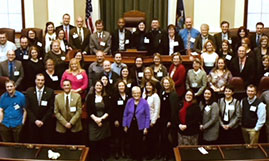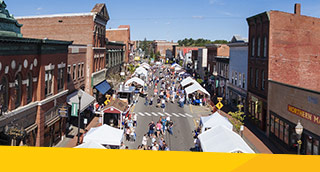Getting Started
Maine Downtown Affiliate & Municipal Program Details
Maine Downtown Affiliate Application Timeline
Maine Downtown Affiliate Application
Is your community ready?
How do you know if formally becoming a Main Street (nationally designated) or Downtown Affiliate (state-designated “little sister” program) is right for your downtown or neighborhood business district? Is your community ready to take on the effort? The Main Street Four-Point Approach® is a terrific and effective framework for addressing commercial district revitalization. You’ll first need the right attitude toward revitalization and some nuts-and-bolts ingredients in order to make the program successful.
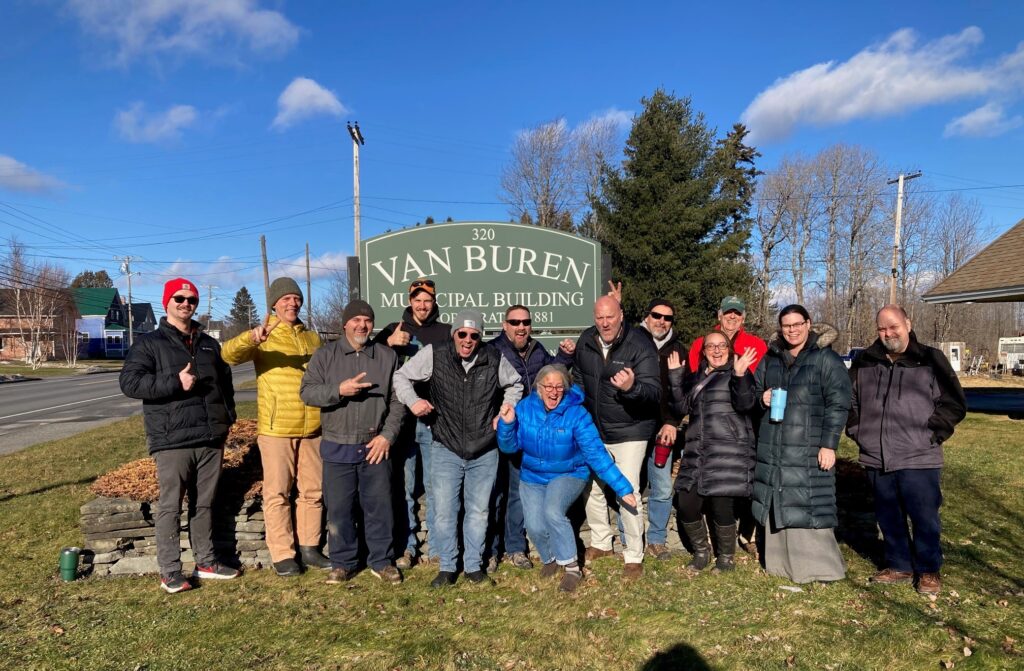
Consider the following:
Is your commercial district a traditional business district?
While any commercial district could achieve success using the Four Points, the Main Street and Downtown Affiliate Programs are intended for traditional business districts. You should have a good concentration of older or historic buildings remaining to give yourself a base of structures to work with. Newer, low density automobile-oriented commercial development, strip shopping centers, or enclosed shopping malls may want to borrow techniques from the Main Street Four-Point Approach®, but they really aren’t appropriate for consideration as a Main Street district.
Do you have a decent concentration of businesses remaining in your commercial district?
You’re much more likely to have success with Main Street if you have a core of businesses remaining in your commercial district. This gives you an economic base on which to build. While it’s not impossible to revive a completely vacant commercial district, it is considerably harder to attract investment to such a district.
Are you committed to addressing Main Street’s revitalization in a comprehensive and incremental way?
To be successful, stakeholders need to understand and be committed to the importance of working simultaneously in each of Main Street’s Four Points. The community also needs to understand that the program achieves success incrementally, and that initially making smaller changes in the commercial district will lead to larger achievements and more sophisticated projects over time.
Do you have a broad base of support for a local Main Street Maine or Affiliate program?
You need a balance of public and private participants—and funding—in order to make the program succeed. That means that in addition to the traditional participants in Main Street revitalization—business and property owners and city officials—non-traditional participants need to be engaged in the revitalization effort, too. Will you be able to pull in residents, civic associations, schools and other institutions, banks, utilities, media, and more to help with the program? It is absolutely essential that your Main Street program be as inclusive as possible with a broad and varied cross-section of the community committed to assisting and supporting the program.
Can participants agree?
The first hurdle is agreeing whether or not to pursue a Main Street or Affiliate program. Beyond that, participants also need to be willing to discuss and come to agreement about a myriad of issues and projects that affect the commercial district. To be successful, local stakeholders must believe in the value of a consensus-driven program and reject the traditional notion that one or two people should call all the shots on Main Street. While this requires good processes and sometimes lengthy discussions to reach agreement, the result is a lasting and positive change on Main Street that the entire community feels good about.
Do you have adequate human and financial resources to implement a successful Main Street or Downtown Affiliate program?
Average local program budgets vary, but you’ll have to be able to raise money for Main Street’s operation and for revitalization projects. Similarly, you’ll need the ability to recruit and retain staff (for Main Streets) and volunteers (for Main Streets and Downtown Affiliates) who are interested in Main Street revitalization projects. It’s not unusual for a local program to have 30-60 active volunteers among its board, committees, and projects. (Fortunately, implementing Main Street’s Four Points leads to lots of diverse activities that can attract a variety of individuals.) Main Street organizations will need to have the resources to hire and retain a director for the program to assist with revitalization efforts. In smaller communities/commercial district, a part-time director is an option; larger cities/districts will need full-time staff or equivalent, if not multiple staff to coordinate Main Street’s efforts. Downtown Affiliates are not required to have staff.
Does your community value historic preservation?
Retaining and reusing your commercial district’s existing building is an important cornerstone of the program. Local stakeholders need to be receptive to “recycling” existing businesses for new economic uses and to being respectful of the traditional architecture and overall character of the traditional business district.
If you can answer “yes” to each of these questions, then you’re likely to have great success with the Main Street Four-Point Approach® and you should proceed with creating your own local program, and visit the Getting Started section.
If you are not fully confident that your community meets the above descriptions, then you have a couple of options:
- Continue your education and organizing efforts until you can answer “yes” to each question.
- Incorporate Main Street however you can into your revitalization efforts. You can borrow pieces of the Main Street Four-Point Approach® even if your community isn’t ready to do a comprehensive Main Street program. We encourage you to take the parts that fit your community best at this time. Of course, if you are not implementing a full Main Street program, you are not allowed to use the Main Street title in your organization’s name.
Follow these steps
Should your community decide to pursue the goal of becoming a Main Street or Maine Downtown Affiliate community, these three steps will get you started:
Step 1: Initial inquiry
Schedule an initial conversation with the Maine Downtown Center staff and educate yourself in the Main Street Four-Point Approach®
Step 2: Program investigation
Call a town meeting to inform citizens about the program. Participants should include: downtown building and business owners, chamber, representatives from city and county government, historic society, betterment committees, CLG’s, economic development groups, bankers, hospital, schools, industry, media, seniors, youth, churches, residents, etc. Basically, the list should include all community players.
Invite a representative from a Main Street community to speak at the meeting and inform the group about their local program. Good attendance would be considered to be between 50 and 100 people. This should help you reach consensus on whether or not to continue program investigation.
Organize a core group who will commit to doing a thorough investigation of the program. Typically this group should visit at least one Main Street or Downtown Affiliate Program town of similar size.
Following the community visits, hold a second meeting inviting all who attended the first meeting, to hear the results of the group findings. Build consensus on whether or not to proceed to the application stage. Staff or Advisory Council member of the Maine Downtown Center should be invited to speak at this meeting. Attendance of 50 or more is expected.
Step 3: Application
If an application is going to be submitted, the community will be assigned a mentor to coach the community during the process. The application process may take months to prepare. During that time begin a media campaign to inform the community about Main Street.
Maine Downtown Affiliate & Municipal Program Details

